Contents
Guide

The author and publisher have provided this e-book to you for your personal use only. You may not make this e-book publicly available in any way. Copyright infringement is against the law. If you believe the copy of this e-book you are reading infringes on the authors copyright, please notify the publisher at: us.macmillanusa.com/piracy. As Christopher Logues widow, and now the trustee of his estate, I have many people to thank, principally Christopher Reid for the delicacy, perception and affection he has brought to the task of assembling and introducing the last fragmentary text. A project that has stretched over decades, War Music has needed and found many supporters, critical and financial, at different stages in its development, and all should be remembered at its conclusion.
Donald Carne-Ross suggested and commissioned the first part of it for the Third Programme (BBC Radio Three) in 1959. Since then it has had the benefit of information or criticism from: Lindsay Anderson, Laurence Aston, Liane Aukin, who also directed the stage versions and later recordings, Sally Belfrage, Charles Rowan Beye, Charles Boyle, James Campbell, Ron Costley, David Godwin, Jasper Griffin, Michael Hastings, Paul Keegan, Colin Leach, Peter Levi, Ruth Padel, George Plimpton, Bernard Pomerance, Donna Poppy, Kathleen Raine, George Rapp, Stephen Spender and George Steiner. Financial support came from or because of: Raymond Danowski, Bernard Pomerance, Bernard Stone, the Arts Council of Great Britain, the Bollingen Foundation, the Drama Department of BBC (Radio), the Society of Authors and Lord Weidenfeld. Others who helped in various ways were: Mme Jacques Brel, Hugo Claus, Jane Feaver, Ian Hamilton Finlay, Robert Fogarty, Michael Foster of Janes Information Group, Alastair Fowler, Jonathan Galassi, Victoria Getty, John Gross, Shusha Guppy, Melville Hardiment, Christian Hesketh, Philip Howard, Penny Jones, Oona Lahr, Joanna Mackle, Andrew Motion, Ferdinand Mount, Michael Rogers, John Simpson of the Oxford University Press, Christian Smith, Aoibheann Sweeney, Martin Taylor of the Imperial War Museum, Michael Taylor, Stephen Tumim and Kathleen Tynan. After 1984 Christopher enjoyed particularly happy and profitable relationships with his fellow poets and editors at Faber & Faber, Craig Raine, who persuaded him to return to War Music , and Christopher Reid, who has seen it to its conclusion. War Music s most enduring friend was the late Paul Getty, and I am grateful to him and to Mark Getty for their continued support, and for permission to reproduce material in the Wormsley Library.
For this collected edition my own thanks go to Matthew Hollis for overseeing it, to Martha Sprackland for assisting him and to Rob Tufnell for providing the inspiration for the cover. Rosemary Hill Christopher Logue died in 2011, at the age of eighty-five. His funeral was held in London at St Pauls Church, Covent Garden, nicknamed the Actors Church. The service ended memorably and movingly when from behind the mourners a lone trumpeter played a verse of the Victorian hymn What a friend we have in Jesus the tune to which soldiers of the First World War sang the less pious but equally yearning words, When this lousy war is over. War music, indeed. And an emotionally overwhelming theatrical coup.
Perhaps at that moment it was on the minds of many in the congregation to wonder if, before his death, Logue had been able to complete his magnum opus , the rewriting of the Iliad Homers epic of lousy war which had occupied him for five decades and for which he is now best known. He had not; old age and illness had prevented it; so by that reckoning this volume is incomplete. It represents, nonetheless, a poetic achievement of the highest order. What it offers, in simple terms, is the attempt of a man who had served briefly as a soldier, but who had never fought in battle, to understand the nature of war and to find narrative and musical expression for it. Although he used the Iliad as his guiding text, Logues purpose was decidedly not to make a translation. He enters the fray more actively than any translator could have done.
The given material setting, principal characters, plot are recognisably Homeric, but so much had to be changed if this was to become a work fit to address, however obliquely, the realities of our own bellicose era. Hence the speeded-up, frequently cinematic reimagining of scenes, both in the world of the gods and on the battlefield; hence the racy and sometimes harsh and jarring language; hence the flagrant anachronism of many of the metaphors all designed to startle us into recognition of what in Homer remains eternally true and applicable to our condition. None of this force is lost through failure to be completed. We are lucky, in fact, that a sufficient number of passages that would almost certainly have gone into War Musics projected final book, Big Men Falling a Long Way , can be salvaged to give a broad idea of both the books shape and its moods. These passages are collected in an appendix to this volume, along with a necessary account of editorial procedure and some notes. For the rest, we have I cant quite say pure Logue, but lets call it the magnificently rich impurity that resulted when a great poet of our time measured his own powers against those of possibly the greatest poet of all.
Christopher Reid See Logues own candid account of his military service in Prince Charming: A Memoir (2000). Two limestone plates support the Aegean world. The greater Anatolian still lies flat, But half an aeon since, through silent eyes: Ave! God watched the counterplate subside, until Only its top and mountain tops remained Above His brother, Lord Poseidons, sea: And that, I shall call Greece. And those, Her Archipelago, said He. Then turned away To hear Apollo and the Nine perform Of Creation, from the stage at Table Bay. They enter.
They attend. They bow. The Lord of Light and Mice gives them their note. And then they sing: In the beginning there was no Beginning, And in the end, no End An Account of Books 12 Picture the east Aegean sea by night, And on a beach aslant its shimmering Upwards of 50,000 men Asleep like spoons beside their lethal Fleet. Now look along that beach, and see Between the keels hatching its western dunes A ten-foot-high reed wall faced with black clay Split by a double-doored gate; Then through the gate a naked man Run with what seems to break the speed of light Across the dry, then damp, then sand invisible Beneath inch-high waves that slide Over each others luminescent panes; Then kneel among those panes, burst into tears, and say: Mother, You said that you and God were friends. Friends. Friends.
Good friends. That was your boast. You had had me, your child, your only child To save Him from immortal death. In turn, Your friend, the Lord our God, gave you His word, Mother, His word: If I, your only child Chose to die young, by violence, far from home, My standing would be first; be best; The best of bests; here; and in perpetuity. And so I chose. Nor have I changed.
But now By which I mean today, this instant, now That Shepherd of the Clouds has seen me trashed Surely as if He sent a hand to shoo The army into one, and then, before its eyes, Painted my body with fresh Trojan excrement. Sometimes Before the gods appear Something is marked: A noise. A note, perhaps. Perhaps A change of temperature. Or else, as now, The scent of oceanic lavender, That even as it drew his mind Drew from the seal-coloured sea onto the beach A mist that moved like weed, then stood, then turned Into his mother, Thetis, lovelost face, Her fingers, next, that lift his chin, that push His long, redcurrant-coloured hair Back from his face, her voice, her words: Why tears, Achilles? Rest in my arms and answer from your heart. The sea as quiet as light.


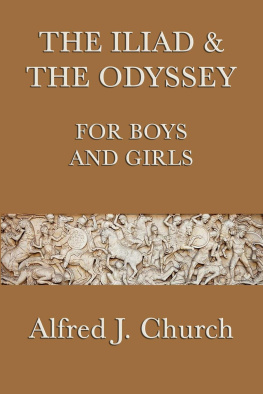
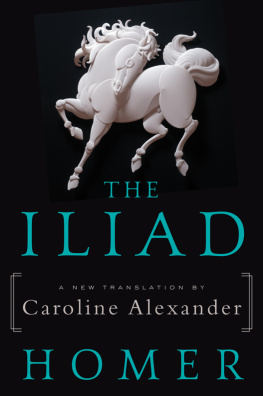
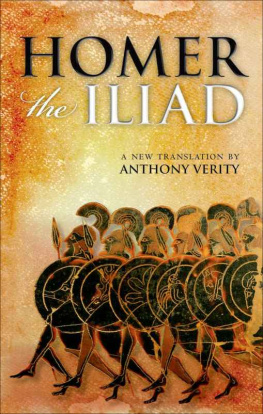
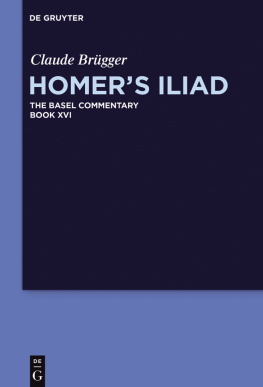
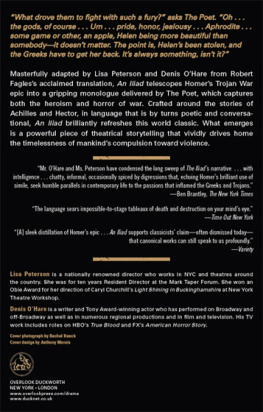
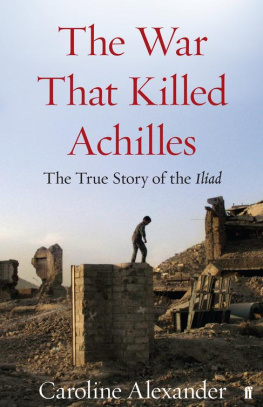
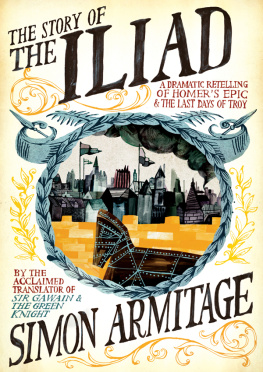
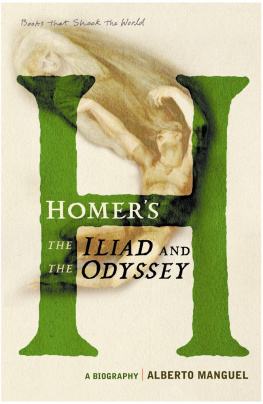
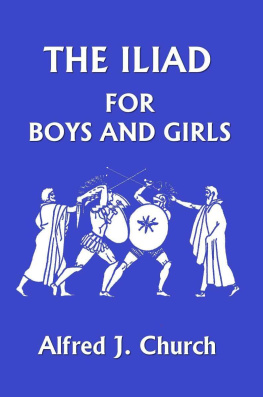
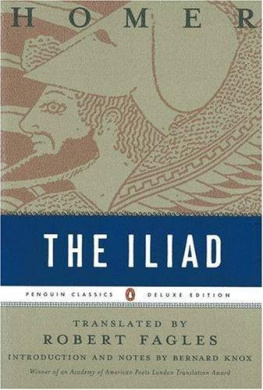
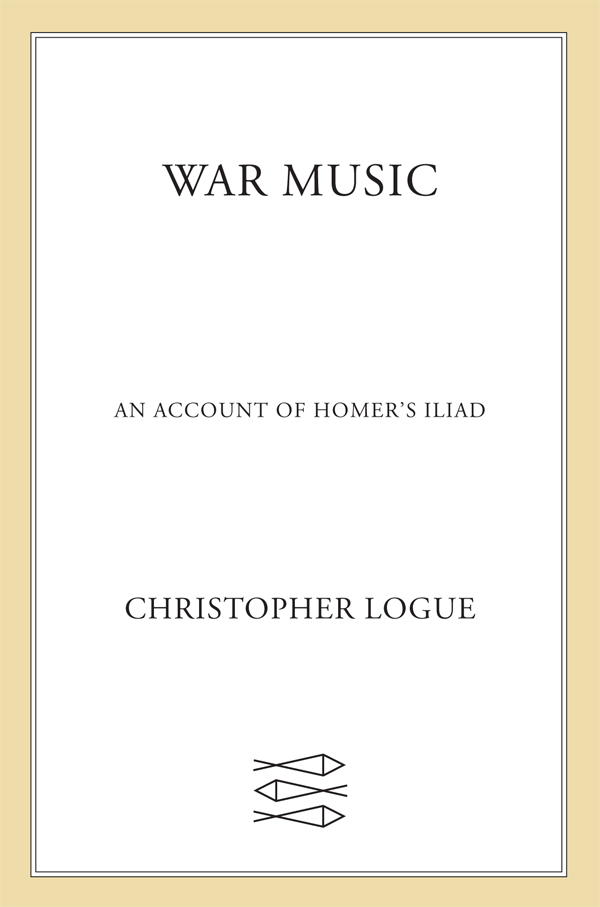
 The author and publisher have provided this e-book to you for your personal use only. You may not make this e-book publicly available in any way. Copyright infringement is against the law. If you believe the copy of this e-book you are reading infringes on the authors copyright, please notify the publisher at: us.macmillanusa.com/piracy. As Christopher Logues widow, and now the trustee of his estate, I have many people to thank, principally Christopher Reid for the delicacy, perception and affection he has brought to the task of assembling and introducing the last fragmentary text. A project that has stretched over decades, War Music has needed and found many supporters, critical and financial, at different stages in its development, and all should be remembered at its conclusion.
The author and publisher have provided this e-book to you for your personal use only. You may not make this e-book publicly available in any way. Copyright infringement is against the law. If you believe the copy of this e-book you are reading infringes on the authors copyright, please notify the publisher at: us.macmillanusa.com/piracy. As Christopher Logues widow, and now the trustee of his estate, I have many people to thank, principally Christopher Reid for the delicacy, perception and affection he has brought to the task of assembling and introducing the last fragmentary text. A project that has stretched over decades, War Music has needed and found many supporters, critical and financial, at different stages in its development, and all should be remembered at its conclusion.